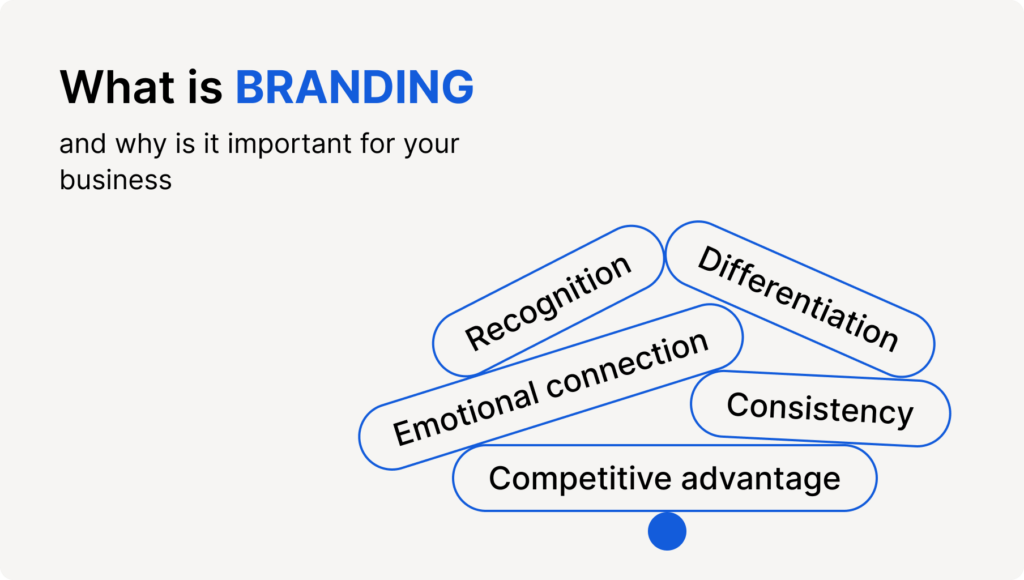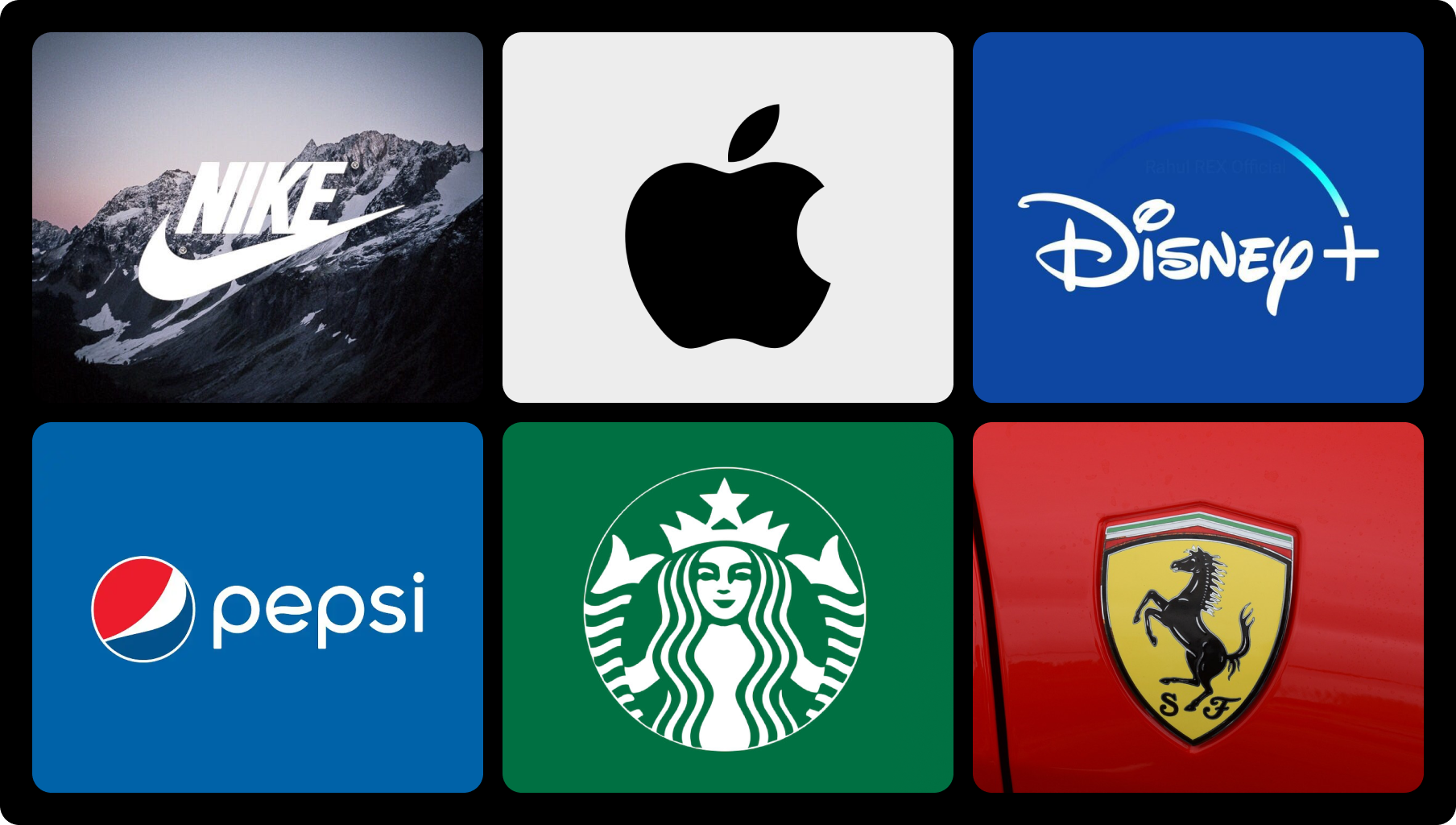Branding is how a business creates a unique identity that people can easily recognize. This involves designing a specific name, logo, or symbol that tells customers what the business stands for.
But branding today is much more than just a logo. It includes a company’s values, how it treats customers, and the emotions it sparks in people. A strong brand shapes how customers see a business and plays a major role in building loyalty, trust, and long-term success.
Why is Branding Important?
Branding is crucial because it directly affects how customers perceive a business. When people think of a brand, they often associate it with certain feelings or images.
Take Apple, for example —The three keywords that guide Apple’s branding are simplicity, creativity, and humanity. These values shape how Apple’s products look, feel, and sound. If something doesn’t reflect these, it’s not considered Apple. These qualities make Apple products easily recognizable and trusted.
Nike is another example. Its “Just Do It” slogan pushes people to believe in themselves and act, creating an emotional connection with customers that builds loyalty. Branding gives consumers something to relate to and connect with beyond the product or service they’re actually buying.

Apart from the identity branding offers your business, it also,
Gives Your Business a Competitive Advantage
Branding helps businesses stand out from competitors. In a market with so many options, having a memorable and unique brand makes a difference. Whether through a clever logo, unique products, or consistent messaging, strong branding gives businesses an edge and helps them stay top of mind for customers. Over time, good branding adds value to a company and contributes to its long-term success. This can even lead to premium pricing, as loyal customers are often willing to pay more for brands they trust.
Influences Buying Choices
Branding affects how people see your products or services. A good brand image can make people feel like your business stands for quality, value, or even a lifestyle they relate to. Studies show that 71% of customers are more likely to buy from brands they trust. Many also prefer brands that share their values.
Helps Marketing and Advertising
Branding makes your marketing efforts more effective. When people already know and trust your brand, your promotions have a greater impact
Makes Your Business Memorable
A strong brand helps people remember your business. It’s the “face” of your company and sets you apart from others in a crowded market. A good way to stay memorable is by creating content that resonates with your audience.
The Core Elements of Branding
Branding involves more than just a name or a logo. It’s everything about how your business is seen by others. Let’s check out the basic elements of branding and how we made them work for our clients:
- Brand Name & Logo: This is a company’s visual identity. It includes the brand’s name, logo, and design, which are the most recognizable parts. When you think of companies like Nike or Apple, the first thing that comes to mind is their logos. These symbols make it easy for customers to recognize the brand. For instance, our client, Kensi, struggled to stand out as an online retail store in an ever-competitive e-commerce niche. But by designing a unique logo, we made their business easy to spot.

- Tagline/Slogan: A tagline is a memorable catchphrase that tells people what the brand is about in just a few words. A famous example of a successful tagline is “Red Bull gives you wings.” This short phrase quickly tells people what the brand is about energy and action. It’s memorable, easy to understand, and has been used consistently in Red Bull’s marketing campaigns.
- Brand Personality: This is how the brand “acts” or “talks.” It’s the voice, tone, and behavior of the brand. A company’s personality makes it relatable to its audience. We helped The Beauty Clinic develop a brand personality that is both elegant and modern. This made it easier to connect with customers who value refinement.
- Values & Mission: These represent what the brand stands for, including the beliefs and purpose of the business. For example, Luxbury, a luxury goods reseller, wanted to show customers that they prioritize quality and authenticity. These values were central to their branding, building trust with customers.
- Unique Selling Proposition (USP): The USP is what makes the brand stand out from others. It’s the special thing that makes customers choose one brand over another. Airkor, a company that has embraced medical innovation, highlights reliability and progressiveness to stand out in the competitive healthcare industry.
Types of Branding
Corporate Branding
Corporate branding is used by large companies to create a consistent image across all their products and services. Companies like Apple and Google have strong corporate brands that customers recognize and trust. Everything they offer reflects their brand’s core values, whether it’s a product, service, or customer experience.
Personal Branding
Personal branding is when individuals, like celebrities or industry experts, create their own brand to reflect their personality and skills. For example, Elon Musk and Oprah Winfrey are well-known for their personal brands. Their branding shows who they are, what they stand for, and how they influence the world around them.
Product Branding
Product branding focuses on making a specific product stand out. Coca-Cola and Pepsi, for instance, both sell cola, but their branding makes them feel different to customers. Coca-Cola is often associated with happiness and nostalgia, while Pepsi appeals to a younger, more energetic audience.
Service Branding
This type of branding is for businesses that offer services rather than products. Companies like Airbnb and Uber use branding to emphasize customer experience, trust, and convenience. These brands focus on making their customers feel safe, valued, and well-served.
Retail Branding
Retail branding applies to stores and e-commerce platforms. It’s all about how a business presents itself in physical or digital spaces. Brands like Kensi and Amazon create consistent, memorable shopping experiences, both online and in-store, that reflect their core values.
Things to Consider for an Effective Branding Strategy
Company Values & Mission
Branding isn’t just about looking good—it’s about making sure your company’s core values and mission shine through in everything you do. When your brand authentically reflects what your company stands for, it builds trust with customers, helps form stronger connections, and ensures that your messaging feels real. It shows people not just what you sell but what you believe in. This alignment between branding and values makes your business more relatable, credible, and consistent, helping you stand out.
Target Audience
Knowing who your audience is makes all the difference in branding. A brand that speaks directly to its target audience is more likely to connect and build loyalty. The better you understand your audience, the more likely your brand will stand out and succeed.
Competitive Analysis
Competitive analysis helps you see where your brand can shine. Your branding should focus on what makes you different and unique in the market. And you can only know this by looking at your competitors and identifying their strengths and weaknesses. With this decisive information, it’s easier to highlight your strengths and give customers reasons to choose you over others.
Promotion Channels
Promote your brand on the platforms that matter most to your audience. Whether it’s social media, paid ads, or content marketing, the key is to keep your message consistent everywhere. Your branding should feel the same no matter where people see it. Consistency across all channels helps build trust and recognition.
Some Branding Channels to Consider
Website
Your website is often the first place customers interact with your brand. It’s essential for showing off what makes you special, so capitalize on it to deliver your message, find supporters, and provide a unique user experience.
Moreover, the fact that most online journeys begin with a search engine is enough reason to prioritize optimizing your site for organic traffic. An SEO-friendly website increases your chances of reaching more customers and making more sales.
Social Media
Over 60% (5.17 billion people) of the global population are on social media, making it arguably the most reliable channel for connecting with diverse audiences and reinforcing brand identity. As far as branding is concerned, social media opens the doorway to many possibilities, from providing customer support to sharing your brand’s values. Engaging with users on platforms like Facebook, Instagram, and X can also turn them into loyal supporters and ambassadors for your brand.
Advertising
Digital advertising plays a crucial role in promoting your brand. Ads on platforms like Google and social media allow you to reach specific groups of people based on their interests and behaviors, making it easier to connect with your target audience.
Offline ads, like those in magazines or on billboards, can reach a larger audience but may not be as precise, especially in a largely digitized global marketplace.
Physical Presence
Even with the rise of online shopping, many people still enjoy visiting physical stores. They like to see and touch products before buying them. Having a physical presence lets you create a personal connection with customers, making their experience more memorable.
Launch Your Brand Today
Branding has never been more essential for businesses to grow and create lasting connections with customers. A strong brand sets you apart, builds loyalty, and helps your business succeed over time. If you’re looking to develop a brand strategy that showcases what makes your product unique, Project Branding is here to guide you. We specialize in building strategies that highlight your strengths and deliver real results. Book a free consultation today to start building a powerful, lasting brand.



